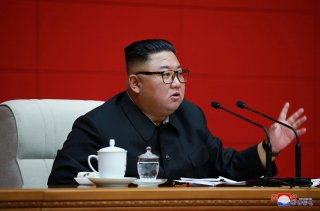North Korea’s Kim Il Sung University Claims Academic Achievements
Kim Il-Sung University, named for Kim Jong-un’s grandfather and North Korea’s original leader, was founded in Pyongyang in 1946 as North Korea’s first university.
North Korea may not be known as an academic powerhouse, but there appears to be a propaganda effort underway to create that reputation for one of its universities.
The Yonhap News Agency reported this week that the regime outlet DPRK Today is claiming that Kim Il-sung University “has registered over 130 academic papers in international journals in the past year.”
“Our professors and researchers have waged an academic and technological battle and published over 130 research papers in prestigious international journals,” DPRK Today quoted the dean of the university’s science department as saying. It’s part of North Korea’s effort to diversify its economy and embrace technology.
It’s not clear what exactly those papers and journals were, although the Yonhap story lists such disciplines as “physics, chemistry and gymnastics.” As has been demonstrated repeatedly throughout the coronavirus pandemic, a wide variance exists between academic journals that are legitimate and those that are dodgier.
Kim Il-Sung University, named for Kim Jong-un’s grandfather and North Korea’s original leader, was founded in Pyongyang in 1946 as North Korea’s first university. North Korea’s current first lady, Ri Sol-ju, is believed to be a graduate of Kim Il-Sung University, and her husband Kim Jong-un, went there as well, although he got some of his education abroad.
The BBC, in a rare look inside by the Western press, reported from the university in 2016. The video featured a group of singers, accompanied by a band, singing a song called “Let’s Glorify Our Country, As The General Intended.” Also in the video, the BBC’s reporter, Rupert Wingfield-Hayes, was repeatedly interrupted by authorities and escorted out of places.
The university is decorated by a large statue of Kim Il-Sung, and also features a computer lab, albeit one where the computers lack unrestricted Internet access.
PRI, in 2019, profiled a student named Alek Sigley, an Australian who was studying at Kim Il-Sung University, in order to obtain a master’s degree in order to obtain a romance in North Korean literature. He also tweeted regularly, a rare thing in Pyongyang.
“You need connections. There’s not really an open application process,” Sigley said at the time about getting into the college. “The university has a website but, if you go there, you won’t find any information whatsoever on how to apply.”
Later in 2019, Sigley was “kidnapped” by the North Korean regime, was forced to sign a false confession to spying, and was ultimately freed, per Insider.
Sigley continues to tweet, and to include Kim Il-Sung University in his Twitter bio. He announced in February that he has been accepted into a doctoral program at Stanford University, joking on Twitter that Stanford was “a bit of a step down from Kim Il Sung University, but I'll accept the offer nevertheless.”
Stephen Silver, a technology writer for the National Interest, is a journalist, essayist and film critic, who is also a contributor to The Philadelphia Inquirer, Philly Voice, Philadelphia Weekly, the Jewish Telegraphic Agency, Living Life Fearless, Backstage magazine, Broad Street Review and Splice Today. The co-founder of the Philadelphia Film Critics Circle, Stephen lives in suburban Philadelphia with his wife and two sons. Follow him on Twitter at @StephenSilver.
Image: Reuters


